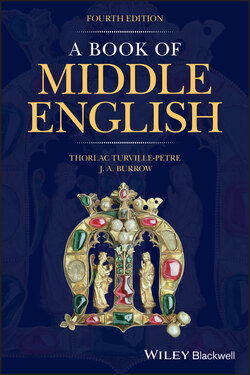Читать книгу A Book of Middle English - J. A. Burrow - Страница 24
2.4 Stress
ОглавлениеThe main rule governing word‐stress in Middle English is to place the primary stress on a word’s first syllable unless that syllable is an unstressable prefix. Thus: wíldernes, kíngdom; but uncoúþ, bihýnden. Since this is also modern English practice, the reader will encounter no difficulty with most words.
Stressing on the first syllable was a general rule in Germanic languages, which therefore governed Scandinavian borrowings in Middle English as well as native words. The rule in medieval French, however, was almost the exact opposite: to stress a word on the heavy syllable closest to the end of the word (so not, for example, on an unstressable final /ǝ/). English has borrowed many words from French, and in most cases these now conform to the Germanic rule; but in Middle English such words commonly vary between French and native stressing – thus, natúre beside náture. Mossé, in his Handbook of Middle English, illustrates this with a line of Chaucer’s: ‘In dívers art and in divérse figures’.
Middle English words of two or more syllables have, more frequently than in Modern English, a secondary as well as a primary stress. Thus Gower can rhyme lye with avánterìe (13/39, 40) and springe with knówlechìnge (13/15, 16).
